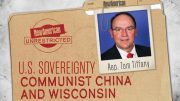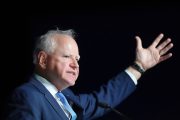The vice-presidential debate last Wednesday night was yet another example of candidates not following the rules of debate: Both candidates went over their time limits, interrupting each other and frequently giving answers that failed to address the questions.
Even the moderator, Susan Page of USA Today, ran off the rails with one of her questions. Unfortunately, Vice President Mike Pence didn’t adequately stick up for his boss, who was unfairly targeted by Page’s loaded question. Page asked:
President Trump has several times refused to commit himself to a peaceful transfer of power after the election. If Vice-President Biden is declared the winner and President Trump refuses to accept a peaceful transfer of power, what would be your role and responsibility be as Vice-President? What would you personally do?
Vice President Pence’s reply did not address the question of “What would you personally do?” but he did mention some of the dangers of universal mail-in voting, asserting it would create the possibility for massive voter fraud. Pence also admonished Senator Harris, saying, “I must tell you, Senator, your party has spent the last three and a half years trying to overturn the results of the last election.”
More importantly, the vice president didn’t address the presupposition of President Trump’s supposed refusal to commit to a “peaceful transfer of power.”
This calls to mind H. Res. 1155, a resolution passed by 397-5 in a roll call vote in the House of Representatives on September 29.
H. Res 1155 — the Will of the People?
H. Res 1155, as downloaded from Congress.gov, has some very clever but disturbing wording. It says the House of Representatives “intends that there should be no disruptions by the President or any person in power to overturn the will of the people of the United States.”
One of the five “No” votes against the resolution was cast by Representative Thomas Massie (R-Ky.), who was quoted in the Louisville Courier as describing the bill as a “disingenuous political statement meant to poke the President in the eye.” Massie was further quoted as being critical of both Speaker Pelosi and Minority Leader McCarthy for refusing to have a roll call vote on a $2 trillion bailout package but going through the recorded vote process in the House on what Massie described as “tripe.”
What does “no disruptions” mean? Certainly there should be no frivolous actions intended to cause unnecessary delays. But does that mean no requests for recounts? Something as vaguely worded as “no disruptions” could be also used as propaganda fodder against a congressman who insists on a roll call vote when the power elites in Congress would prefer not to have a record of which representatives voted yea and which voted nay on a multi-trillion dollar boondoggle.
Even more disturbing in H. Res 1155 is the “will of the people” clause. Will that clause be interpreted as an affirmation of the National Popular Vote Interstate Compact? It well could be. In an interview published by CBS News on November 10, 2000, then Senator-elect Hillary Rodham Clinton was quoted as saying, “we should respect the will of the people and to me, that means it’s time to do away with the Electoral College and move to the popular election of our president.”
Is the nationwide popular vote really an accurate way to measure the will of the people? The December 19, 2016 print issue of The New American featured an article entitled “Who Really Won the Popular Vote?” referring to the presidential election of that year. That article cited a number of evidences of electoral fraud, such as a Project Veritas interview with Democrat operative Scott Foval, who boasted, “We’ve been rigging elections for 50 years,” and another interview with Alan Schulkin, a New York City commissioner on the Board of Elections, who said, “I think there is a lot of voter fraud.”
Things have only gotten worse since then, largely due to court cases where judges have issued court orders for expanded use of mail-in balloting, one of the riskiest forms casting ballots.
Th vice-presidential debate isn’t the first time Vice President Pence has made a half-hearted effort to back his boss on the issue of election integrity. On May 11 of 2017, President Trump established the Presidential Advisory Commission on Election Integrity and appointed Vice President Pence to chair it. The commission was appointed for the purpose of looking into numerous aspects of vote fraud, including improper voter registrations and voter suppression. The commission was subjected to a number of lawsuits and was disbanded on January 3, 2017, a scant eight months after its formation. Vice President Pence could have done a better job, such as taking it to the people and asking them to back the commission.




